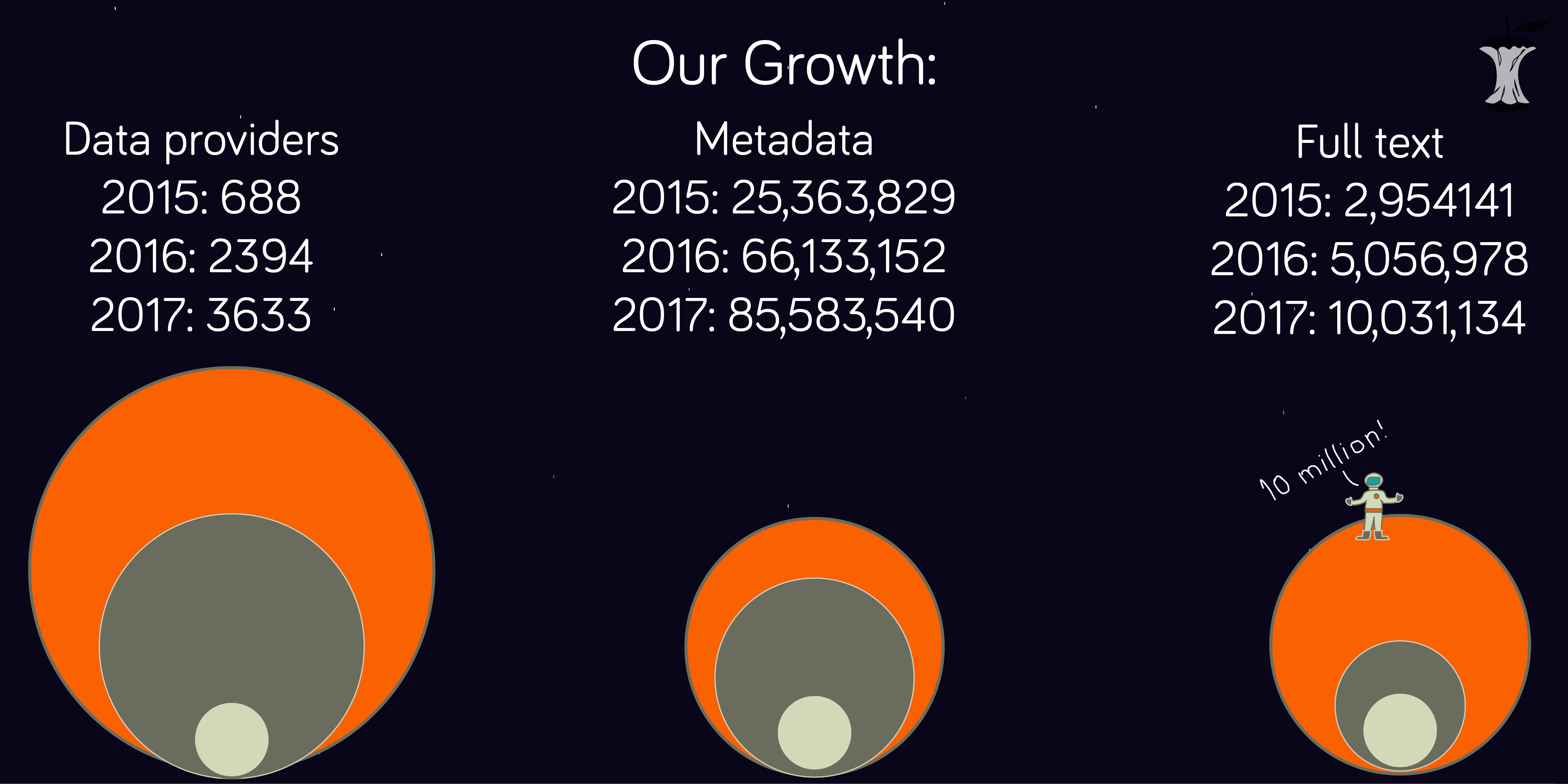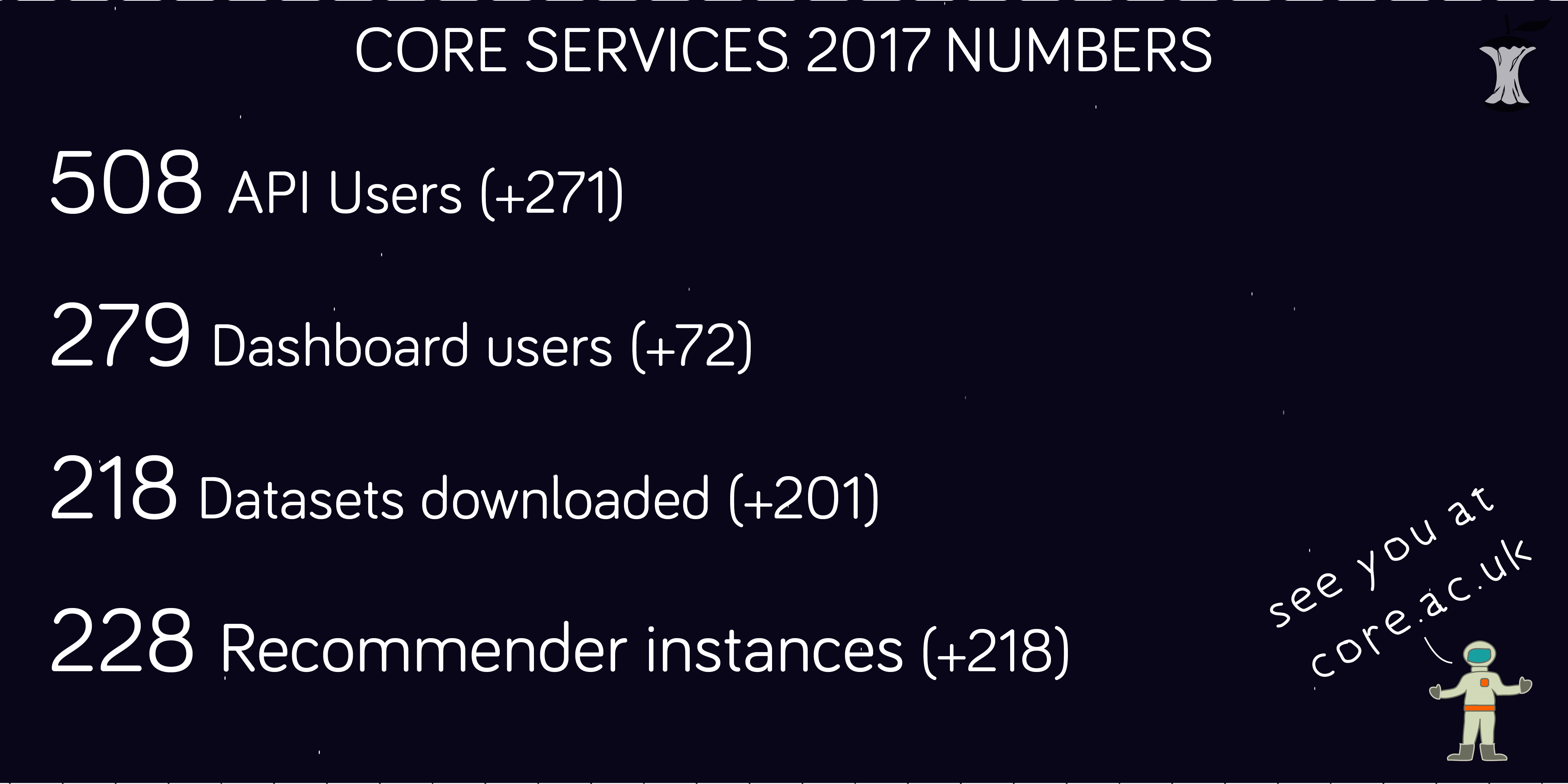I am currently working with Martin Klein, Matteo Cancellieri and Herbert Van de Sompel on a project funded by the European Open Science Cloud Pilot that aims to test and benchmark ResourceSync against OAI-PMH in a range of scenarios. The objective is to perform a quantitative evaluation that could then be used as evidence to convince data providers to adopt ResourceSync. During this work, we have encountered a problem related to the scalability of ResourceSync and developed a solution to it in the form of an On Demand Resource Dump. The aim of this blog post is to explain the problem, how we arrived to the solution and how the solution works.
Category: CORE
CORE’s Open Access content has reached the Moon! (or how about them stats 2017 edition)
For yet another year (see previous years 2016, 2015) CORE has been really productive; the number of our content providers has increased and we have now more open access full text and metadata records than ever.
Our services are also growing steadily and we would like to thank the community for using the CORE API and CORE Datasets.
We also offer other services, such as the CORE Repositories Dashboard, CORE Publisher Connector and the CORE Recommender. We received great feedback with regards to the CORE Recommender, with George Macgregor, Institutional Repository Manager at Strathclyde University, reporting:
CORE enhances library discovery services
The CORE service is working in partnership with ProQuest to deliver more content within their library discovery services (Ex Libris Primo and Ex Libris Summon). What does this mean for the end user? This means that search results will bring back more relevant content from OA repositories worldwide in addition to the existing library collection records. The user will not have to go to a separate search interface to run the same search query.
CORE visits Ethiopia and participates in an Open Science training session
EIFL’s invitation to CORE to take part in a workshop for researchers from developing countries pays dividends for participants and for CORE.
In June 2017, EIFL invited the global open access full text aggregator CORE to take part in an Open Science train-the-trainer course for universities and research institutions in EIFL partner countries.
Watch the videos recorded during the workshop and read more…
Solomon Mekonnen – Open Access Ethiopia
Implementing the CORE Recommender in Strathprints: a “whitehat” improvement to promote user interaction
by George Macgregor, Institutional Repository Coordinator, University of Strathclyde
This guest blog post briefly reviews why the CORE Recommender was quickly adopted on Strathprints and how it has become a central part of our quest to improve the interactive qualities of repositories.
Back in October 2016 my colleagues at the CORE Team released their Recommender plugin. The CORE Recommender plugin can be installed on repositories and journal systems to recommend similar scholarly content. On this very blog, Nancy Pontika, Lucas Anastasiou and Petr Knoth, announced the release of the Recommender as a:
CORE reaches a new milestone: 75 million metadata and 6 million full text
CORE is continuously growing. This month we have reached 75 million metadata and 6 million full of text scientific research articles harvested from both open access journals and repositories. This past February we reported 66 million metadata and 5 million full text articles, while at the end of December 2016 we had just over 4 million full text. This shows our continuous commitment to bring to our users the widest possible range of Open Access articles.
To celebrate this milestone, we gathered the knowledge of our data scientists, programmers, researchers, and designers to illustrate our portion of metadata and full text with a less traditional (sour apple) “pie chart”.
Introducing the CORE interface for the R programming language
Update 19/06/2017: The CORE package has been renamed from “rcore” to “rcoreoa”.
The R programming language has come a long way from being mainly a data analysis powerhouse (R is a descendant of Bell Lab’s S language) to a general purpose language with the powerful features that we know today.
CORE and R have not been total strangers; the first release of the “rcore” package in February 2016 from rOpenSci provided the R users with an interface for CORE’s API. rOpenSci works towards providing access to data repositories through R and promotes maintainable and reproducible tools for scientific methods and analyses.
CORE listed Number 1 in the list of top 21 free online journal and research databases

An online editing and proofreading company, Scribendi, has recently put together a list of top 21 freely available online databases. It is a pleasure to see CORE listed as Number 1 resource in this list. CORE has been included in this list thanks to its large volume of open access and free of cost content, offering 66 million of bibliographic metadata records and 5 million of full-text research outputs. Our content originates from open access journals and repositories, both institutional and disciplinary and can be accessed via our search engine. In addition, we also offer an API and Datasets for programmable access to this content, enabling the development of new artificial intelligence-based applications for scientists and for carrying out text and data mining of scientific literature.
CORE releases a new website version
A couple of days ago we released a new version of our website and if you visit our main page it now looks slightly different.

One of our aims was to showcase in a more clear way the CORE testimonials, i.e. what others think of the project and how the community uses our products, mainly our API and Datasets. In an effort to give credit to the universities and companies that are using our services, such as our Recommender and API, we are now displaying their logos on our main page. Our last new item is our research partners; CORE could not offer some of its services without co-operating with other projects, such as IRUS-UK, RIOXX and more.
CORE now offers 5 millions of open access full-text research papers
CORE is thrilled to announce that it currently provides 5 millions of open access full-text papers.

“In the last year, we have managed to scale up our harvesting process. This enabled us to significantly increase the amount of open access content we can offer to our users. With more and more open access content being made available by data providers, thanks to recent open access policies, CORE now also captures and provides access to a higher percentage of global research literature ”, says CORE’s founder, Dr Petr Knoth.





